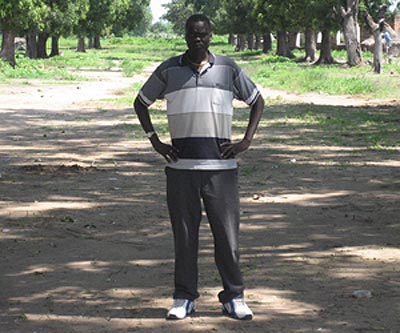 |
| Madut Majok returned to his childhood home of WauĀ in Sudan in 2007 and was reunited with his father, sisters and brothers. Here he stands in front ofĀ two rows of majestic Mahogany trees, still standing despite the years of civil war. |
Theyāre called the Lost Boys of Sudan ā children who were wrenched from their families in one of Africaās cruelest civil wars. Villages were burned, crops were destroyed, farm animals were killed. Thousands of children were forced to flee, often without their parents.
And so it was for Madut Majok, 31, who is finishing his masterās degree at »ĘÉ«Ö±²„ while working as a policy analyst for Citizenship and Immigration Canada in Ottawa.
From rural south Sudan, he was just eight years old when he was separated from the rest of his family and marched from one refugee camp to another, eventually landing in Kakuma Refugee Camp in Kenya.
School, set up in the camp, gave him a focus and a way out of the camp. He applied to the Student Refugee Program run by World University Service of Canada (WUSC) in 2001 and was selected to come to »ĘÉ«Ö±²„.
And so the former Lost Boy found a place he could call his own.
āI had tremendous help and tremendous relationships,ā explains Mr. Majok, over the phone, during his lunch break at his job in Ottawa. āHalifax, I call my hometown. »ĘÉ«Ö±²„ is my community.ā
Foreign land
At first, everything was strange and overwhelming. Intimated by »ĘÉ«Ö±²„ās size, he arrived to a vacant campus a week before the fall term and moved into an empty Howe Hall. He seemed to be constantly losing his way, and was grateful when Joanne McRae, a Dal WUSC volunteer, drew up a map showing the way from his residence room to the dining hall.
Bewilderment turned to dismay once classes started and he found it difficult to follow what professors were saying. And who knew what other students were talking about when they referred to the TV shows they watched or the music they were listening to?
āI remember one night, I went back to Howe Hall wondering if I could pass,ā says Mr. Majok. āI could barely understand the accents. It was very light to my ears. Would I ever catch on?ā
Unsure about how to approach his professors, he recalls taking his concerns to his economics professor, Michael Bradfield, who has since retired.
āHe asked me to sit in front of the class, He told me to interrupt him if I needed clarification and to follow him to his office after the lecture if I still didnāt understand,ā says Mr. Majok. āMost importantly, he told me to form my own opinion about what was said in class. He gave me a lot of his time and it made me so keen to learn much more.ā
He took Dr. Bradfieldās advice to heart and began articulating his own opinions. He participated in class and initiated discussions. Often those discussions spilled out of the classroom and down the hall on the way to the next class. āWhat a treasure trove this was for me. I really dove in. Iād ask something in class, someone else would counter and we would exchange our views and trade perspectives. Such lively debate.ā
'Pinnacle'
Other students helped him fit in. They showed him around the campus, how to sign out books at the library, how to type. āI was barely computer literate. It would take me four days to type out a 1,000Ā word essay. But such patience! These friends would help me figure out the keyboard and sit near me while I typed.ā
The other adjustment was the need to start supporting himself. WUSC covered housing, food and tuition expenses for one year, but after that the students were on their own.Ā Peter Wallace, then the faculty adviser for WUSC and retired professor of Earth Sciences,Ā impressed on him the need to start making money and sticking to a budget.Ā So, Mr. MadutĀ got a job at the Killam Library, where he worked for four years. When he walked across the stage of the Rebecca Cohn to pick up his degree, a contingent of librarians whooped and cheered.
āGetting that degree is the pinnacle,ā says Mr. Madut, who graduated in 2006 with a BA majoring in International Development Studies and Political Science. āI went to primary school but the dream of going to university was not there for me.
āAnd I think of these students at »ĘÉ«Ö±²„, raising money and helping out so someone like me has a chance. I would say I am very lucky.ā
In this video, Madut Majok talks about his childhood, war, separation from family and his arrival at »ĘÉ«Ö±²„. The video, Journey to Canada, was produced by Mr. Majok's employer, Citizenship and Immigration Canada.
